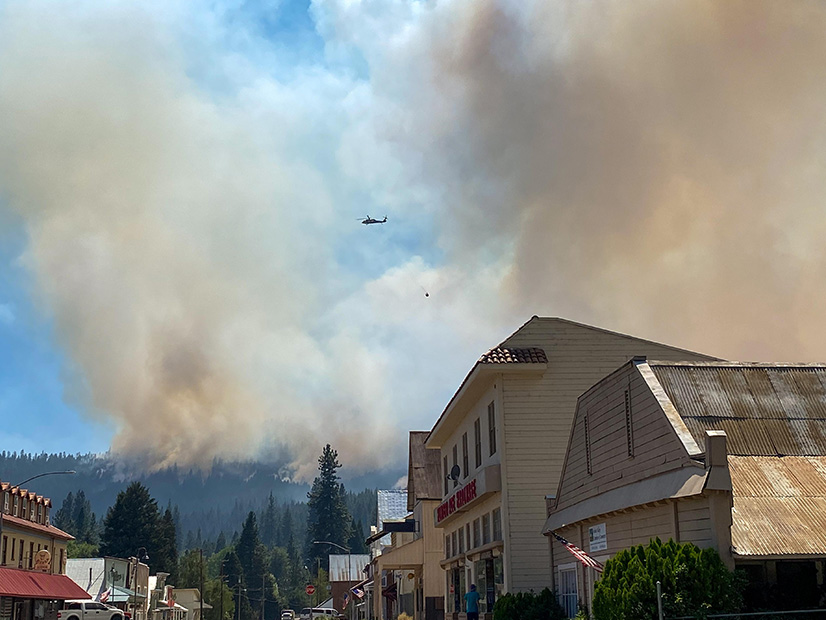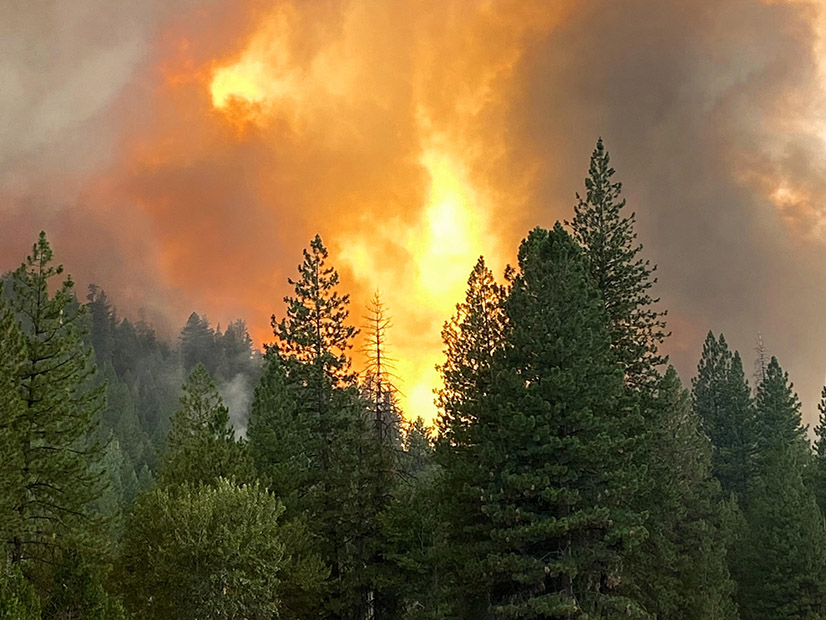
The Dixie Fire, a massive wildfire that Pacific Gas and Electric equipment is suspected of causing, exploded overnight and destroyed the historic gold rush town of Greenville, Calif., home to 1,000 residents, as it moved toward more populated areas.
Known for its Old West-style Main Street, Greenville lies 20 miles northeast of Paradise, a town of 27,000 residents destroyed by the PG&E-caused Camp Fire in November 2018.
“We lost Greenville tonight,” U.S. Rep. Doug LaMalfa (R-Calif.), who represents the area, said in an emotional video posted to Facebook. He lamented the continuing loss from the fires that have plagued the state in the past five years.
Driven by strong winds, the Dixie Fire grew by 20,000 acres to more than 322,500 acres on Wednesday and Thursday, making it the sixth largest fire in state history. It has destroyed 400 structures, but no deaths have been reported, the California Department of Forestry and Fire Protection (Cal Fire) said.
Firefighters and aircraft had “aggressively attacked large flame fronts in an effort to defend structures [Wednesday night],” the U.S. Forest Service said. “As fire entered the Greenville area, firefighting efforts shifted to assist law enforcement in evacuation efforts. A damage assessment team is being requested to evaluate damage in the Greenville community.”
Initial reports showed that about 75% of the town’s structures were destroyed, the Forest Service said.
The fire pushed Thursday toward Chester, a town of more than 2,000 residents on the west shore of Lake Almanor, a popular summer spot surrounded by homes. Thousands of residents had to evacuate as the fire approached.
“A red flag warning remains in effect today through 8 p.m. [Thursday],” the Forest Service said. “Extreme fire behavior with long range spotting, crown fire and group torching is anticipated.”
PG&E’s Possible Role
The Dixie Fire began on July 13, near where a tree had fallen onto a PG&E distribution line in the rugged Sierra Nevada foothills.
Cal Fire seized PG&E equipment as part of its investigation, which is ongoing. (See PG&E Says Its Line May Have Started Dixie Fire.)
The utility said in its second-quarter 10-Q report to the U.S. Securities and Exchange Commission on July 29 that it would likely face new liabilities from the Dixie Fire, with potentially serious consequences for the struggling company.

“While the cause of the 2021 Dixie Fire remains under investigation and there are a number of unknown facts surrounding the cause … the utility could be subject to significant liability in connection with this fire,” the report said. “If such liability were to exceed insurance coverage, it could have a material impact on [PG&E’s] … financial condition, results of operations, liquidity and cash flows.”
PG&E emerged from bankruptcy in July 2020, after a reorganization that included giving 22% of its shares to a trust for fire victims.
The state’s largest utility was blamed for catastrophic wildfires in 2015, 2017 and 2018 that cost it tens of billions of dollars. The blazes included the Camp Fire, the state’s deadliest and most destructive wildland blaze, which killed at least 84 residents and leveled Paradise.
PG&E pleaded guilty to 84 felony counts of involuntary manslaughter in the fire.
PG&E equipment is suspected in major fires in 2019 and 2020, including the Kincade Fire in Sonoma County, for which it is being criminally prosecuted. (See Prosecutors Charge PG&E for 2019 Kincade Fire.)
It now faces charges in last year’s Zogg Fire, which killed four residents of rural Shasta County. (See PG&E Faces New Criminal Charges, Wildfire Liability.) The fire was caused by a pine tree falling on a PG&E line, Cal Fire determined.


